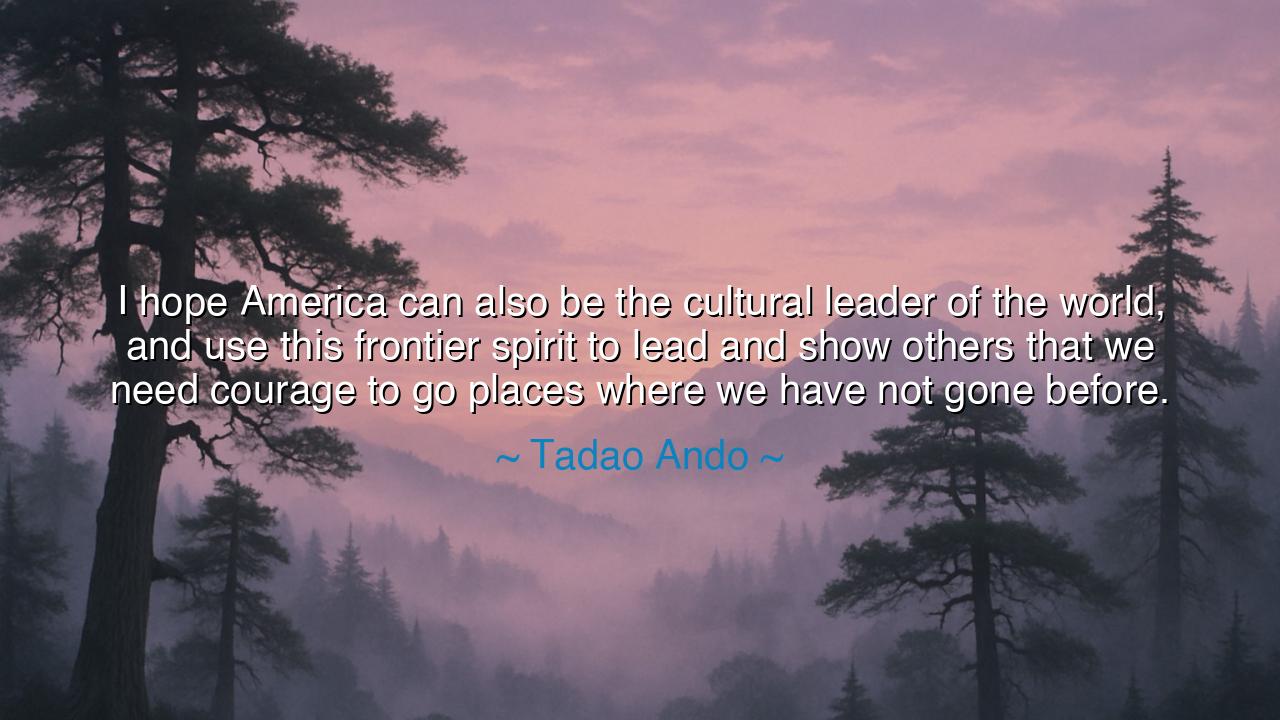
I hope America can also be the cultural leader of the world, and
I hope America can also be the cultural leader of the world, and use this frontier spirit to lead and show others that we need courage to go places where we have not gone before.






The great Japanese architect Tadao Ando, a man whose art fuses concrete and light into the poetry of silence, once said: “I hope America can also be the cultural leader of the world, and use this frontier spirit to lead and show others that we need courage to go places where we have not gone before.” In these words, Ando speaks not merely of architecture or art, but of the destiny of nations — and of the inner calling within every human being to push beyond the boundaries of the known. His message is both a hope and a challenge: that a people blessed with freedom and creativity must not rest in comfort, but must possess the courage to explore new frontiers of the mind, of the spirit, and of culture itself.
To understand the weight of this quote, one must understand the soul of Tadao Ando himself. Born in Osaka in 1941, in a Japan devastated by war, he was a man who rose without formal training — guided only by curiosity, discipline, and a fierce belief in beauty. His life embodies what he praises in this quote: the frontier spirit — that willingness to walk paths untrodden, to seek meaning in the void, to find creation where others see only limits. Ando saw in America, with its vast landscapes and restless imagination, a symbol of that pioneering courage — a place that once dared to cross oceans, split atoms, and dream of reaching the stars. Yet he warns that such a spirit must not fade into materialism or complacency; it must be rekindled, transformed into cultural courage, where creation and compassion become the new frontiers of civilization.
For centuries, this frontier spirit has defined not just nations, but humanity itself. It was the spirit that sent explorers across unknown seas, that drove scientists like Galileo and Einstein to challenge the heavens, and artists like Picasso to reinvent the language of form. But Ando’s vision is not of conquest — it is of creation. He speaks of a courage not of empire, but of imagination. To be a cultural leader, a society must not dominate others, but inspire them; it must light the path toward greater understanding, unity, and beauty. This leadership is not measured in weapons or wealth, but in the ability to elevate the human soul through art, architecture, and the moral imagination.
History offers us glimpses of this ideal. In the Renaissance, Florence led the world not by force, but by awakening minds — through the brush of Leonardo da Vinci, the chisel of Michelangelo, and the vision of thinkers who believed that humanity could touch the divine through knowledge and art. Likewise, in the twentieth century, America led the world not only through industry and innovation, but through its cultural light — through the poetry of Whitman, the music of Gershwin, and the dreams of those who reached toward the moon. These were acts of courage, not because they defied danger, but because they defied limitation — because they believed that the human spirit, when free, can transcend itself.
Ando’s hope, however, is also a warning. He saw in modern civilization a danger — that in its pursuit of power and profit, it might lose its sense of wonder, its reverence for truth, its capacity for stillness. The frontier spirit, he reminds us, is not about expansion outward, but inward — into the depths of creativity, empathy, and meaning. The true frontier now is not geography, but consciousness. If America — and indeed, any nation — wishes to lead, it must lead through example, by showing that courage lies not only in discovery, but in self-reflection, in bridging divides, in daring to imagine a more humane world.
In Ando’s own works, we see this philosophy made stone. His buildings, from the Church of the Light in Osaka to the Fort Worth Modern Museum of Art in Texas, stand as temples of stillness amid the noise of modernity. They do not scream for attention; they whisper of eternity. His architecture teaches that true leadership in culture begins with humility — with listening, observing, and shaping space so that the human spirit may breathe. Just as his structures use shadow to reveal light, so must civilizations use introspection to reveal wisdom. This is the courage he speaks of — not only to create, but to create with conscience.
So, my child, take this teaching to heart: the frontier spirit lives not only in nations but in souls. You too are called to venture beyond the safe and the known — to speak, to build, to dream in ways that uplift others. Let your courage be quiet but firm, your imagination bold but humble. Do not fear failure, for failure is the proof that you are reaching into new territory. As Tadao Ando teaches, the true path of happiness and greatness lies not in conquering the world, but in illuminating it — through compassion, creativity, and the unending courage to go where humanity has not yet gone before.






AAdministratorAdministrator
Welcome, honored guests. Please leave a comment, we will respond soon